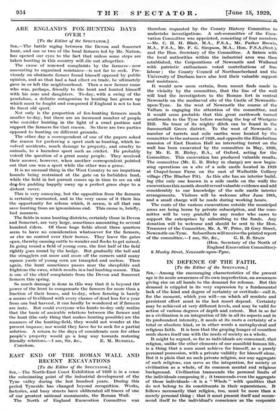ARE ENGLAND'S FOX-HUNTING DAYS OVER ?
[To the Editor of the SPECTATOR.] SIR,—The battle raging between the Devon and Somerset hunt, and one or two of the local farmers led by Mr. Nation, has opened our eyes to the fact that unless some steps are taken hunting in this country will die out altogether. - •
The cause of renewed complaints by the farmers—now amounting to organized resistance—is not far to seek. Pre- viously an obstinate farmer found himself opposed by public opinion, and as that had a bad effect on trade, he ultimately gave in or left the neighbourhood. Then a new farmer came who was, perhaps, friendly to the hunt and hunted himself with his sons and daughters. To-day, with a swing of the pendulum, a definite antagonism to hunting has grown up which- must be fought and conquered if England is not to lose its finest old sport.
Not only is the proportion of fox-hunting farmers much smaller to-day, but there are an increased number of people who consider hunting in the light of a cruel pastime and support the farmers for that reason. So there are two parties opposed to hunting on different grounds.
The other day a correspondent of one of the papers asked the reason for preferr;ng a sport such as hunting, which in- volved accidents, much damage to property, and cruelty to animals, to a harmless sport such as cricket. He probably voiced the question of a great many people. They received their answer, however, when another correspondent pointed out that one was a sport while the other was a game.
It is no unusual thing in the West Country to see impatient • hounds being restrained at the gate on to forbidden land, while the field in hot pursuit comes up in time to see an old dog-fox padding happily away up a perfect grass slope to a distant cover.
This is very annoying, but the opposition from the farmers is certainly warranted, and in the very cause of it there lies the opportunity for reform which, it seems, is all that can save hunting from an ignominious end. This cause is, briefly, bad manners.
The fields in some hunting districts, certainly those in Devon and Somerset, are very large, sometimes amounting to several hundred riders. Of these huge fields about three quarters seem to have no consideration whatsoever for the farmers, or else no control over their horses. They leave the gates open, thereby causing cattle to wander and flocks to get mixed. In going round a field of young corn. the first half of the field rightly goes round by the hedge. But gradually the tail and the stragglers cut more and more off the corners until many square yards of young corn are trampled and useless. Then again, the hunt sometimes passes near the sheepfolds and frightens the ewes, which results in a bad lambing season. This is one of the chief complaints from the Devon and Somerset farmers this spring.
So much damage is done in this way that it is beyond the power of the hunt to compensate the farmers for more than a fraction of their losses, and to-day, when farming is barely a means of livelihood with every chance of dead loss fora year from one bad harvest, it can hardly be wondered at if farmers are irate. But could everyone who hunts to-day only realize that the basis of amicable relations between the farmer and the hunt (the only thing that makes hunting possible) are the manners of the hunting-field, they would not wonder at the present impasse, nor would they have far to seek for a partial solution. A return to the days of considerate care for other people's property would go a long way towards restoring






































 Previous page
Previous page